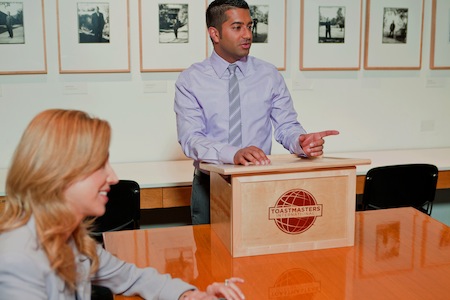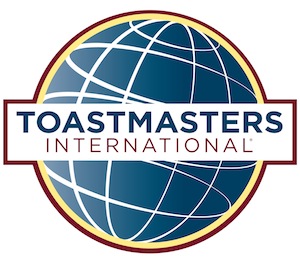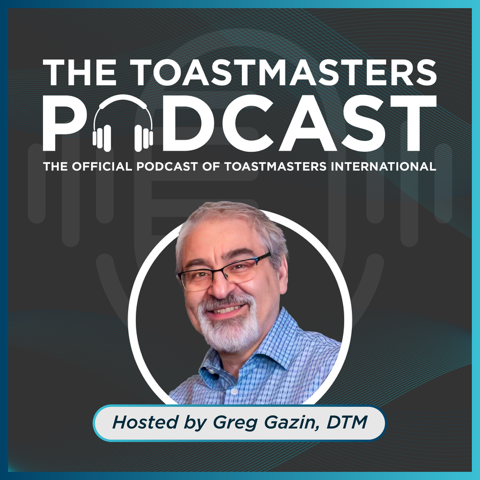Meeting Roles: A Toastmaster Wears Many Hats
During your Toastmasters Experience, members have an opportunity to serve in many capacities. By participating in all functions, they receive well-rounded experience in communication and leadership.

Speaker
A major portion of each meeting is centered around three or more speakers. Their speeches are prepared based on manual project objectives and should last from five to seven minutes for projects in the basic Comminication and Leadership Program manual and eight or more minutes for projects in the Advanced Communication and Leadership manuals. The speeches should be presented in numerical order because each project builds on the skills learned in previous projects.
Click here to find more advice from Toastmasters International on how to be a good meeting speaker.
Evaluator
After every prepared speech, the speaker receives an evaluation. After a member has presented a few speeches, he will be asked to serve as an evaluator and will evaluate one of the prepared speakers for the meeting. In addition to the oral evaluation, he will also give the speaker a written evaluation using the guide in the Communication manual. The purpose of the evaluation is to help the speaker become less self-conscious and a better speaker.
Click here to find out more about this role from Toastmasters International.
Timer
One of the lessons to be practiced in speech training is that of expressing a thought within a specific time. The Timer is the member responsible for keeping track of time. Timers use timing equipment such as stopwatch and signal cards (green, yellow and red) to keep track of time and signal each program participant when the certain time limits have been reached. If the intended time for the speech was 4-6 minutes, the the green , yellow and red signals should be given at 4, 5 and 6 minutes respectively. When the Speaker has finished, his exact actual speaking time should be recorded. At the end of the meeting Timer is called to announce the recorded results.
Toastmaster of the Evening
The main duty of a Toastmaster is to act as a genial host and conduct the entire program, including intoducing participants. If the Toastmaster does not perform the duties well, the entire meeting can end in failure. For obvious reasons this task is not usually assigned to a member until he or she is quite familiar with the Club and its procedures. Program participants should be introduced in a way that excites the audience and motivates them to listen. The Toastmaster creates an atmosphere of interest, expectation, and receptivity.
Click here for a more detailed description of the Toastmaster's role.
Table Topics Master
The Toastmasters program has a tradition - every member speaks at a meeting. The table topics session is that portion of the meeting which insures this tradition. The pupose of this period is to have members "think on their feet" and speak for a one or two minutes or so. The Topics Master prepares and issues the topics. Each speaker may be given an individual subject or a choice of subjectsmay be presented from which the members can draw at random.
Click here for further reading on this role.
General Evaluator
The General Evaluator (GE) is just what the name implies - an evaluator of anything and everything that takes place throughout the meeting. He is responsible for the evaluation team, which consists of the Evaluators, Timer, Grammarian and Ah-Counter. When intruduced by the Toastmaster to conduct the evaluation phase of the meeting, General Evaluator goes to the lectern and introduces each Evaluator. After each recitation, GE thanks him/her for their efforts. GE wraps up by giving his general evaluation of the meeting, he also may comment on the quality of the evaluations.
Click here to find out more from Toastmasters International about this role.
Grammarian
Being Grammarian is truly an exercise in expanding member's listening skills. Grammarian's responsibility is to listen carefully to participants, make notes and at the end of the meeting to comment on the use of English during the course of the meeting.
Click here for more about Grammarian.
Ah Counter
The purpose of the Ah Counter is to note words and sounds used as a "crutch" or "pause filler" by anyone who speaks during the meeting. Words may be inappropriate interjections such as "and, well, but, so, you know". Sounds may be "ah, um, er." At the end of the meeting, when called on by General Evaluator during the evaluation segment, Ah Counter gives his/her report.






